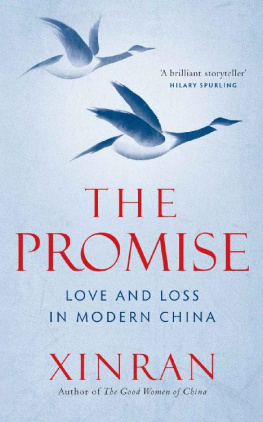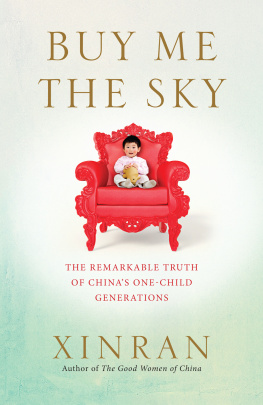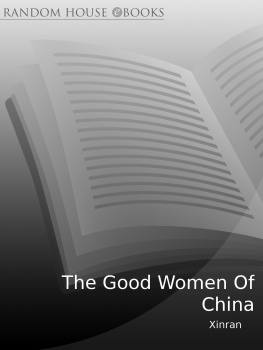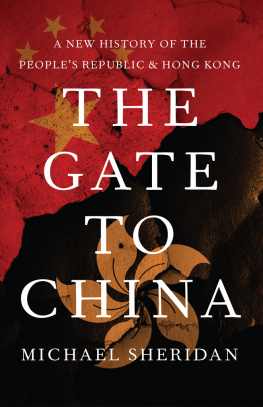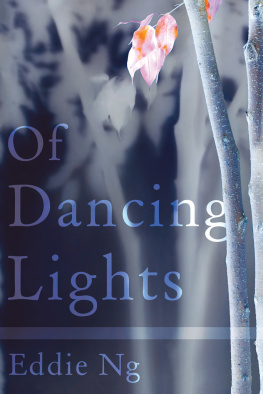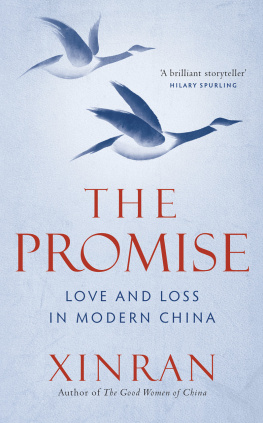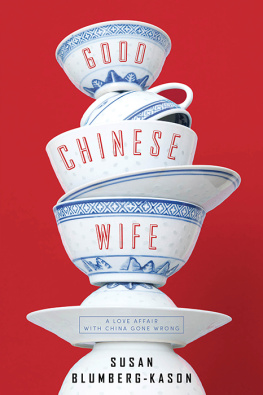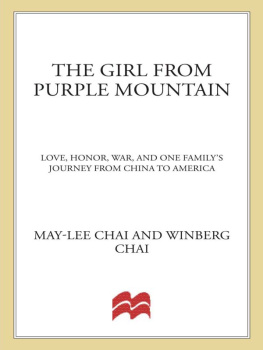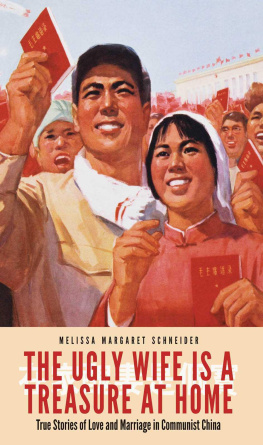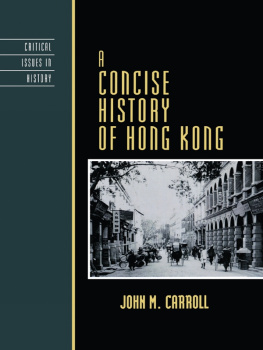Xinran is a British-Chinese author, journalist and activist. Before moving to London in 1997, she was host of Words on the Night Breeze, a groundbreaking radio show in China which invited women from across the country to discuss their issues live on air. Her first book, The Good Women of China , recounted some of these stories. Published in 2002, it became an international bestseller and has been translated into more than thirty languages. She has written one novel, Miss Chopsticks , and four further non-fiction books: Sky Burial , China Witness , Message from an Unknown Chinese Mother and Buy Me the Sky . A collection of Xinrans 20035 Guardian columns, What the Chinese Dont Eat , was published in 2006 and covers a vast range of topics as varied as food, sex education, the experiences of British mothers who have adopted Chinese daughters and whether Chinese people do Christmas shopping or have swimming pools. The Promise is her eighth book.
Xinran lectures and gives speeches on writing, and on Chinese women and history. In 2004, she set up the Mothers Bridge of Love charity to foster understanding between China and the West. Xinran lives in London, but visits China regularly.
Praise for Xinran
One would have to have a heart of stone not to be moved.
Economist on Message from an Unknown Chinese Mother Groundbreaking This intimate record reads like an act of defiance, and the unvarnished prose allows each story to stand as testimony.
The New Yorker on The Good Women of China An absorbing, often startling, always persuasive exploration of contemporary China.
Hilary Spurling, Spectator , on Buy Me the Sky Right here we see the red lines that many Chinese still draw for themselves in public discourse, or even privately, the boundaries they dare not cross even today. No other style of storytelling could have exhibited them with more clarity or greater rawness.
Oliver August, The Times , on China Witness This story of an extraordinary woman written by an extraordinary woman will stay with you long after closing the book.
Christina Lamb, Sunday Times , on Sky Burial Xinran writes with a fine balance of economy, compassion and wisdom, and manages to be at once proud, critical, forward-looking, nostalgic, sad, angry and hopeful.
New Statesman on What the Chinese Dont Eat Xinran evokes the multiple, layered cultures and customs of modern China with bright, memorable detail and empathy for her characters.
Guardian on Miss Chopsticks
Published in 2019 by
I.B.Tauris & Co. Ltd
London New York
www.ibtauris.com
Copyright 2019 Xinran Xue
The right of Xinran Xue to be identified as the author of this work has been asserted by the author in accordance with the Copyright, Designs and Patents Act 1988.
All rights reserved. Except for brief quotations in a review, this book, or any part thereof, may not be reproduced, stored in or introduced into a retrieval system, or transmitted, in any form or by any means, electronic, mechanical, photocopying, recording or otherwise, without the prior written permission of the publisher.
References to websites were correct at the time of writing.
ISBN: 978 1 78831 362 9
eISBN: 978 1 78672 534 9
ePDF: 978 1 78673 534 8
A full CIP record for this book is available from the British Library
A full CIP record is available from the Library of Congress
Library of Congress Catalog Card Number: available
Text design, typesetting and eBook by Tetragon, London
For my beloved husband,
Toby Eady
28 February 194124 December 2017
In the twenty years we knew each other, we came to understand what it truly means to be in love. My darling Toby, without you, so many Chinese authors like me would still be buried seeds, never to sprout in Western literary soil. Without you, I would still feel like an orphan suffering in loneliness, never to become the person I am today your beloved wife and a woman who can feel and understand love.
Thank you, my Toby. You are my soulmate, a man of letters, and your promise of love has led me to this book.
As the poem we both loved goes:
, , ,
Heaven will never grow old, nor will my love for you.
Our hearts are like fishing nets, tied together by a thousand threads.
Contents
Promises and Talking Love
My Inspirations for This Book
Early one morning in February 2012, my husband Toby Eady and I went out for a stroll around Kensington Gardens. The gentle breeze hinted at the approach of spring. The first rays of morning sun danced in the trees, bathing buds still in hibernation. A patch of green on the ground failed to hide its growing presence. The parakeets larked around, greeting their neighbours the crows and the visiting seagulls. The whole scene gave off a most palpable sense of being alive. Toby and I walked in silence, hand in hand, along the narrow path, unable to speak for fear of interrupting the birds peace.
Ive always liked birds. As a child, I would wonder wide-eyed at the various types that visited the fruit trees in the courtyard of my grandmothers house. Some even made their nests up on the high branches. But then the birds disappeared, perhaps because they couldnt bear the human chaos playing out below. It wasnt until the 1980s, when I was working as a journalist in the countryside, that birds once again caught my attention. However, this time they were in peasants cooking pots. (There arent enough food rations. We can only survive by eating whatever we can catch, I was told.)
It is true. You could only find birds in China in cooking ingredients, fairy tales, and those beautiful old paintings.
There is a pond directly in front of Kensington Palace which I like to think of as my own Swan Lake. There, the swans have mingled with the grandsons and -daughters of Queen Victoria for generations, carrying on their respective lines. At night, the royal household holds candlelight feasts for honoured guests from across the world; at dawn, the lake ripples as it welcomes back the swans and other migratory birds. The Chinese say that a persons character is inextricably linked to their local environment. Well, I say a birds is too.
I am ashamed to say that I recognise very few types of birds. Except for swans, mandarin ducks and seagulls, I only know pigeons those birds who seem to be ever-present, and ever looking for love.
That day, we walked along the side of the pond watching the birds stop by for breakfast and a morning shower. Three pigeons caught my attention. One young lady was foraging for food on the bank, followed by two restless young men. She didnt have a moments peace.
Theyre not like us, are they? With pigeons, it always seems to be the men who are nagging, I said to Toby.
Theyre talking about love, said Toby, kissing me on the forehead.
Talking love? You have this saying in English?
In English, we say dating or making love, not talking love. But there are no laws to language only what we express and what we understand. Whats so special about talking love in Chinese?
That last sentence really struck me; I was lost for words.
The past century has seen more upheaval than any other time in the 5,000-year-old history of Chinese civilisation. The ways in which people show love for each other have also changed in the face of war and cultural development. Toby didnt mind my stalling at his first question; he simply moved on to another. We had known each other for more than twenty years, and in that time not only had his questions driven me into the boundless sea of questions on China, but also forced me into the furthest corners of my own knowledge.

